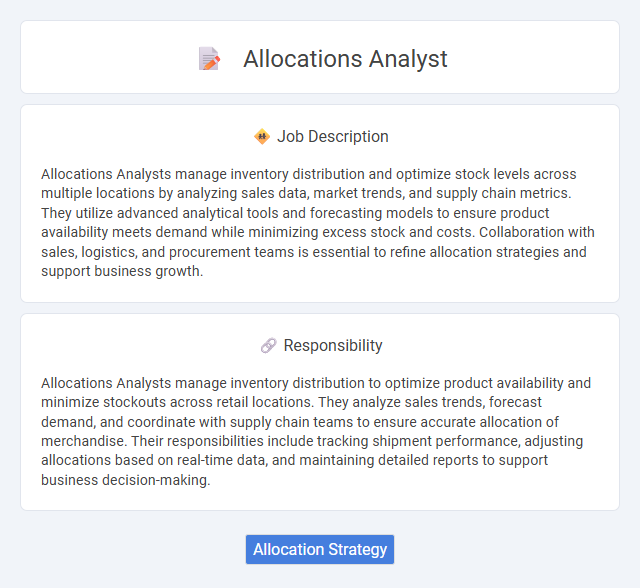
Allocations Analysts manage inventory distribution and optimize stock levels across multiple locations by analyzing sales data, market trends, and supply chain metrics. They utilize advanced analytical tools and forecasting models to ensure product availability meets demand while minimizing excess stock and costs. Collaboration with sales, logistics, and procurement teams is essential to refine allocation strategies and support business growth.
Individuals with strong analytical skills and attention to detail are likely to be well-suited for an Allocations Analyst role. Those who thrive in fast-paced environments and can manage large data sets efficiently probably find this job suitable. Candidates who prefer routine tasks without much variation may not be the best fit due to the dynamic nature of allocation analysis.
Qualification
An Allocations Analyst must possess strong analytical skills, proficiency in data management software such as Excel and SQL, and a solid understanding of supply chain processes. A bachelor's degree in finance, business administration, or a related field is typically required, along with experience in inventory management and demand forecasting. Effective communication and problem-solving abilities are essential to optimize allocation strategies and support organizational goals.
Responsibility
Allocations Analysts manage inventory distribution to optimize product availability and minimize stockouts across retail locations. They analyze sales trends, forecast demand, and coordinate with supply chain teams to ensure accurate allocation of merchandise. Their responsibilities include tracking shipment performance, adjusting allocations based on real-time data, and maintaining detailed reports to support business decision-making.
Benefit
An Allocations Analyst likely plays a crucial role in optimizing resource distribution, which can enhance operational efficiency and reduce costs. This position may offer the benefit of developing strong analytical skills and expertise in data-driven decision-making. Candidates could expect opportunities for career growth in supply chain management or financial planning due to the valuable experience gained.
Challenge
An Allocations Analyst role likely involves complex data management and precise inventory control, presenting challenges in maintaining balance between supply and demand. The role probably demands strong analytical skills to interpret allocation trends and forecast discrepancies accurately. Navigating these challenges could require continuous adaptation to fluctuating market conditions and internal resource shifts.
Career Advancement
An Allocations Analyst plays a crucial role in managing inventory distribution and optimizing supply chain efficiency through data-driven decision-making. Mastery of advanced analytics, forecasting techniques, and ERP systems opens pathways to senior analyst or supply chain manager positions. Continuous skill enhancement in automation tools and strategic planning significantly accelerates career advancement opportunities within logistics and operations management.
Key Terms
Allocation Strategy
Allocations Analysts develop and implement allocation strategies to optimize inventory distribution across multiple channels and locations, ensuring balanced supply meets fluctuating demand. They analyze sales data, market trends, and product life cycles to adjust stock levels proactively, minimizing overstock and stockouts. Expertise in demand forecasting tools and ERP systems enhances their ability to drive efficient inventory management and improve overall supply chain performance.
 kuljobs.com
kuljobs.com